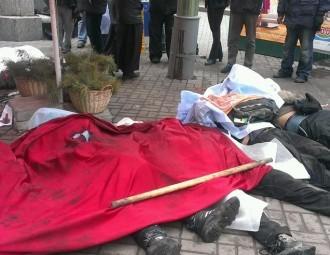Oleksandr Sushko: Ukrainian authorities carried out massacre in Kiev
 bodies of dead people at Maidan
bodies of dead people at Maidan
Any peaceful scenario excludes Yanukovich from all its processes.
Central Kiev is in the heat of battle, blood flows like water at Kiev streets. Only on February 20 more than 70 people died at Maidan. Each day the death toll is growing exponentially.
It is not the best time for interview. However, Oleksandr Sushko, Ukrainian National Coordinator of the Eastern Partnership Civil Society Forum found time to give answers to the questions of the EuroBelarus Information Service.
- Bloodshed at Kiev streets continues: only during Thursday the number of deaths almost reached a hundred people. What did the peaceful protest develop into?
- It has developed into a massacre, carried out by the Ukrainian authorities.
- Yanukovich is blaming opposition in the escalation of conflict, and opposition is blaming Yanukovich. Who is responsible for today’s bloodshed?
- President Yanukovich himself.
- Can we say that Yanukovich crossed the Rubicon, after which no peaceful settlement of the political crisis is possible?
- None of the decisions is possible with Yanukovich’s participation. Any peaceful scenario excludes Yanukovich from all its processes.
- Kremlin blames the West for the escalation of violence in Ukraine, and immediately after that Medvedev urges the authorities “to be legitimate and effective, so that nobody wipes the floor with the authorities”. Which role has Kremlin played in the escalation of violence?
- Russia has been forcing Yanukovich to use force; it has been an ultimatum. If you read Medvedev’s yesterday statement and that of Peskov, you’ll see that they almost openly urge Yanukovich to use force. We can only imagine what Kremlin tells Yanukovich in private.
- Today the foreign ministers of Poland, Germany and France made an attempt to come to an agreement with Yanukovich; however, it seems that their mediatory mission failed. Why?
- The results are not available yet. European ministers spent almost four hours with Yanukovich, but their mission is not completed – they are still in Kiev.
- Is there a solution to this deadlock?
- A lot depends on the parliament – whether they’ll manage to have enough votes to make life-and-death decisions. Now removal of law enforcement officials from power is at stake – those, who give criminal commands to kill people.
-
03.01
-
07.10
-
22.09
-
17.08
-
12.08
-
30.09










































